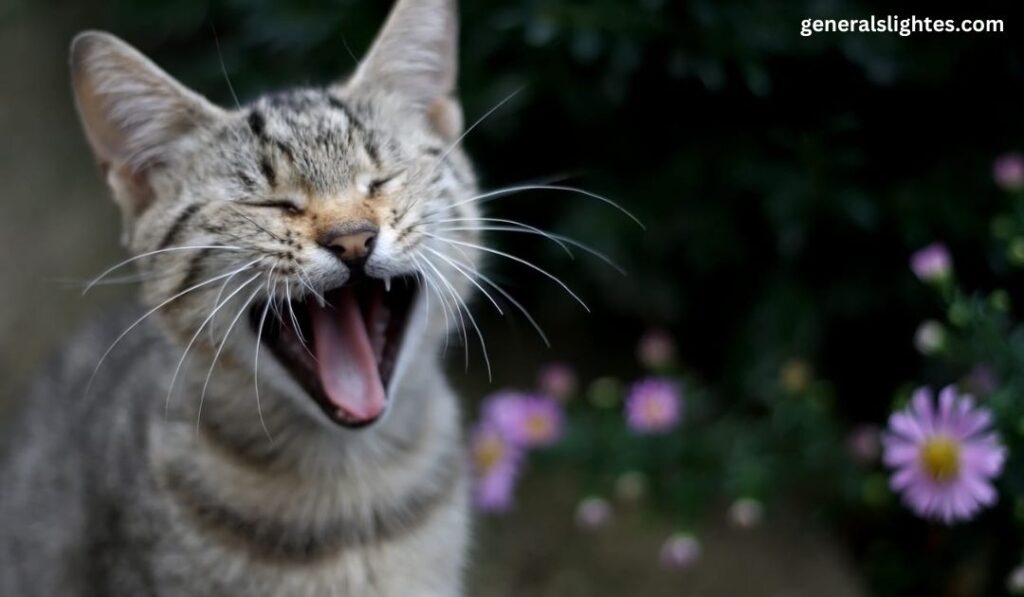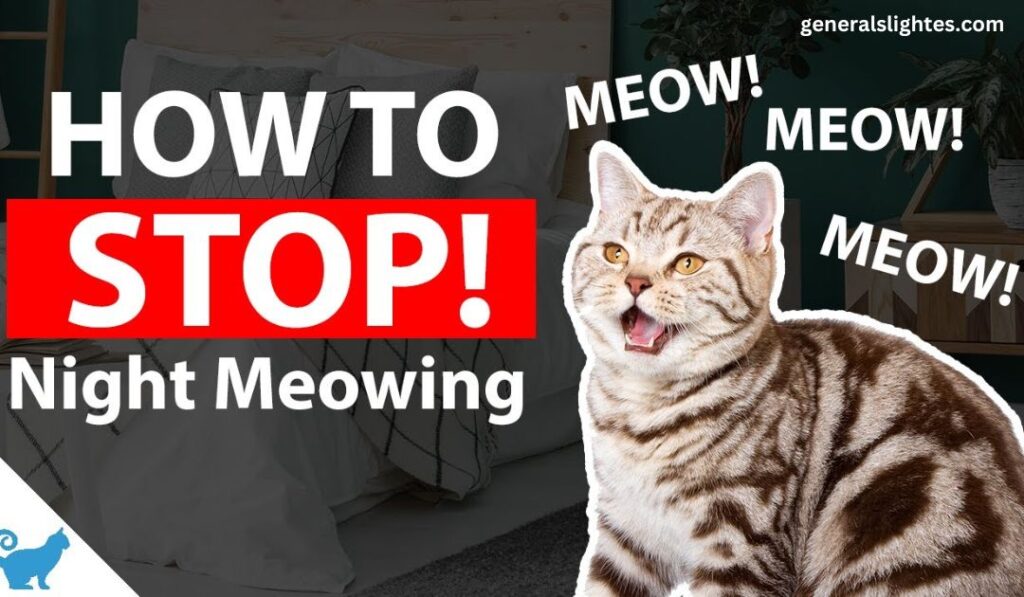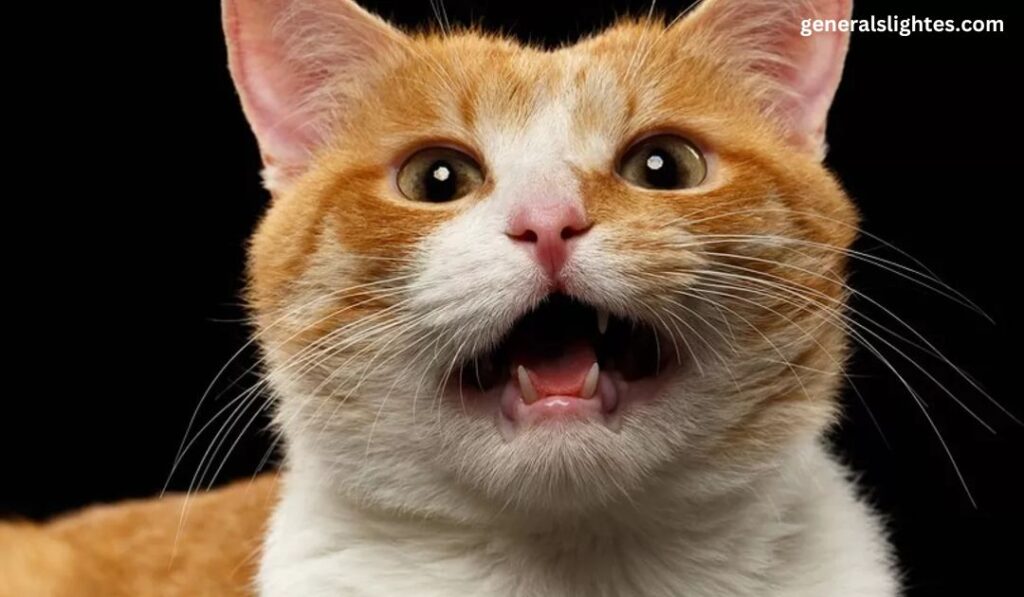Cats meow at night to communicate their needs or desires. It could be due to hunger, boredom, or seeking attention.
Tired of hearing your cat meow at night? You’re not alone! Cats have various reasons for their late-night vocalizations, from hunger to boredom. Let’s dive into what’s causing your feline friend to keep you up and how you can get some peace.
Your cat meows at night because they may be hungry, bored, or feeling restless. Cats are naturally more active during the night, but health issues or even the urge to mate could also be the cause. If your cat feels trapped indoors or is aging, this behavior might increase. Understanding these reasons will help you address them effectively and ensure a quieter night.
Why Do Cats Meow at Night?
Cats meow at night for a variety of reasons, such as seeking attention, expressing boredom, or responding to their natural instincts. Health issues like thyroid disease or aging can also cause this behavior. By understanding these factors, you can take steps to help your cat feel more comfortable and reduce their nighttime vocalizations.

- Natural Night Activity: Cats are naturally more active at night, following their crepuscular behavior. This leads to increased meowing during quieter hours.
- Boredom: If your cat feels unstimulated, they may meow to get your attention. Providing toys or playtime before bed can help.
- Health Problems: Conditions like overactive thyroid or kidney disease may cause your cat to vocalize more frequently at night. A vet checkup can help rule out these issues.
- Aging: Older cats may experience cognitive dysfunction, leading to confusion and nighttime meowing. This is common in senior cats and may require special care.
- Feeling Trapped: If your cat is used to being outdoors, they may feel confined inside at night. This can cause them to meow out of frustration or restlessness.
- Mating Calls: Unspayed or unneutered cats might yowl at night as part of mating behavior. Spaying or neutering can help reduce this noise.
- Seeking Attention: Your cat might simply want your company at night. Ignoring their meows can discourage them from seeking attention in the middle of the night.
- Routine Disruptions: Changes in your cat’s environment or schedule can lead to nighttime vocalizations. Keeping a consistent routine can minimize disruptions.
Understanding Your Cat’s Nighttime Behavior
Cats are known for their unique habits, and nighttime meowing is one that often leaves owners puzzled. This behavior can stem from their instincts or an attempt to communicate unmet needs. Understanding these reasons helps in addressing the issue effectively. By paying attention to body language and vocal cues, you can get a better idea of what your cat wants. This way, you can tailor solutions that keep both you and your feline friend happy.
Common Reasons Cats Meow at Night
Nighttime meowing can occur for many reasons, from hunger to loneliness. Cats may vocalize in the night due to boredom, anxiety, or simply because they’re adjusting to new surroundings. Sometimes, it’s a sign they want your attention or something specific, like food or playtime. Identifying the cause behind the meowing helps you respond appropriately. With a little patience, you can often alleviate the issue.
Hunger and Thirst: Basic Needs Calling
If your cat meows at night, they might be signaling hunger or thirst. Cats, especially those with set meal schedules, can get vocal when their feeding times are off. Make sure they have access to fresh water and consider a before-bed feeding to curb the nighttime cries. Addressing these basic needs can make your cat feel more satisfied and relaxed, reducing nighttime meows.
Seeking Attention or Companionship
Cats crave companionship and may meow at night to seek it out, especially if they’ve been alone during the day. They’re letting you know they want to be close, whether for a pet, a cuddle, or just your presence nearby. Engaging your cat in some quality time before bed can help fulfill this need. In return, you may find that they’re quieter through the night.
Boredom or Pent-Up Energy
When cats don’t get enough stimulation or exercise, they can end up with excess energy, which often leads to nighttime meowing. Cats are natural hunters and need both physical and mental activity to stay happy. By adding play sessions during the day, you can help them burn off energy and settle down more easily at night.
Health Issues That Cause Nighttime Meowing
Sometimes, nighttime vocalizations signal health problems that need attention. Issues like hyperthyroidism, pain, or even cognitive dysfunction in older cats can cause them to be more vocal. If the nighttime meowing persists and seems unusual, it’s essential to rule out any underlying medical conditions. Consulting your vet can provide insight and peace of mind.
How Age Affects Nighttime Vocalization in Cats
As cats age, their behavior and vocal patterns often change. Older cats might experience cognitive decline, which can lead to increased nighttime meowing. Senior cats might also struggle with vision or hearing issues, causing disorientation at night. Understanding age-related behaviors helps you create a more comforting environment that meets their evolving needs.
Cats’ Instincts and Nocturnal Nature
Cats are naturally nocturnal creatures, and their instincts often drive them to be more active at night. In the wild, cats would hunt during twilight and early hours. While domesticated cats adapt to our schedules, some still follow these instincts, leading to nighttime vocalizations. Recognizing their nocturnal nature can help you make accommodations to minimize disturbances.
Anxiety or Stress as Triggers for Meowing
Changes in the environment, new pets, or stress can cause your cat to meow more at night. Cats are sensitive animals, and any disruption to their routine can lead to increased anxiety. By identifying and addressing these stressors, you can help your cat feel more secure, which often results in a quieter home during the night.
Tips to Reduce Your Cat’s Nighttime Meowing
To curb nighttime meowing, you can implement several strategies, like providing consistent meal times, plenty of daytime exercise, and a cozy sleeping area. Setting a routine helps your cat know what to expect, making them feel safe and content. These efforts not only reduce nighttime noise but also improve their overall well-being.
When to Consult a Veterinarian for Nighttime Meowing
If your cat’s meowing at night becomes persistent or unusually intense, it might be time to consult a veterinarian. Unusual vocalizations can indicate underlying health issues, and a vet can assess your cat’s physical and mental health. Early detection of problems ensures your cat receives the best care, giving you peace of mind and better sleep at night.
6 Common Reasons Your Cat Meows at Night (And How to Stop It)

Cats meow at night for various reasons, often because they’re naturally more active after dark. They may be bored or feel restless due to a lack of stimulation. Addressing these needs through play or creating a calming environment can help reduce the noise.
Health issues like thyroid problems or aging can also cause increased nighttime meowing. Senior cats may get confused or disoriented at night, leading to more vocalization. Understanding the underlying reasons helps you take steps to calm your cat and stop the meowing.
Cats Are More Active at Night by Nature
Cats are naturally crepuscular animals, meaning they thrive during twilight hours, such as dawn and dusk. This instinct drives them to explore and hunt at night, leading to increased vocalizations. When your cat meows at night, it’s often just expressing its natural energy and behavior. By understanding this activity pattern, you can better anticipate and manage your cat’s nighttime antics. Providing sufficient outlets for their energy can foster more peaceful nights for both you and your feline friend.
Your Cat Might Be Bored or Unstimulated
Boredom can lead to excessive vocalizations in cats, especially at night. Indoor cats miss the excitement of outdoor exploration, which often results in restlessness. If your cat meows frequently, it might be time to introduce more engaging toys or interactive play. Incorporating regular playtime into your routine can keep your cat entertained and content. A well-stimulated cat is less likely to disturb your sleep with nighttime meowing.
Overactive Thyroid or Kidney Disease Could Be the Cause
Increased nighttime meowing can sometimes indicate underlying health issues, such as hyperthyroidism or kidney disease. These conditions often cause discomfort and agitation, prompting your cat to vocalize more frequently at night. If your cat exhibits persistent meowing, alongside symptoms like weight loss or changes in appetite, consult your veterinarian. Early diagnosis is crucial for effective treatment and improving your cat’s quality of life. Addressing these health concerns can help restore peace to your nights.
Aging Could Be a Factor, Especially in Senior Cats
As cats grow older, they may experience cognitive dysfunction, which can lead to confusion and increased vocalizations during the night. Senior cats often become disoriented or anxious in the dark, prompting them to meow for reassurance. Understanding this behavior is essential in providing the necessary support for your aging feline. Ensure their environment remains familiar and comfortable to ease their nighttime anxiety. Creating a safe, well-lit area can significantly reduce their stress and nighttime vocalizations.
Outdoor Cats May Feel Trapped Indoors
Outdoor cats frequently meow at night when they feel confined inside. These cats thrive on roaming and exploring their environment, and being kept indoors can lead to feelings of restlessness. To alleviate this behavior, consider offering more playtime or creating a safe outdoor space. Allowing supervised outdoor access lets your cat engage with its instincts. Ensuring your cat feels free and stimulated can help minimize nighttime meowing and enhance its overall well-being.
Cat Yowling at Night Might Indicate Mating Behavior
If your cat is unspayed or unneutered, excessive nighttime yowling may signal mating behavior. Unaltered cats vocalize to attract potential mates, especially during breeding seasons. This instinctive behavior can be quite loud and disruptive during the night. Spaying or neutering your cat effectively reduces this vocalization and improves overall behavior. Taking this step decreases nighttime noise while promoting better health and wellness for your feline companion.
How to Stop Your Cat from Meowing at Night: 6 Effective Tips
If your cat meows at night, it can significantly disrupt your sleep. Thankfully, several effective strategies can help minimize this behavior. Start by increasing playtime during the day. Engage your cat with interactive toys and stimulating games to burn off excess energy. This extra stimulation will ensure your cat feels more tired and ready to sleep when night falls.

Establishing a nighttime routine for your cat is crucial. Feeding them a small meal before bed can help them feel satisfied and prepared for rest. Additionally, ensure they have a clean litter box and fresh water available throughout the night. Try not to respond to your cat’s nighttime meowing, as this can unintentionally reinforce the behavior. With these simple yet effective tips, you can foster a peaceful sleeping environment for both you and your feline companion.
Play with Your Cat Before Bedtime
Engaging in playtime with your cat before bedtime can significantly reduce nighttime meowing. Use interactive toys like feather wands or laser pointers to stimulate their natural hunting instincts. Aim for at least 15 to 20 minutes of active play to help burn off excess energy. This extra exercise can make your cat feel more relaxed and ready for sleep. A tired cat is less likely to vocalize during the night.
Provide Food and Water Before You Sleep
Feeding your cat a small meal right before bedtime can help curb nighttime meowing. A satisfied stomach often leads to a more restful night for your feline friend. Ensure they also have fresh water available to keep them hydrated. This simple routine can create a sense of comfort for your cat. A well-fed and hydrated cat is less likely to disturb your sleep.
Keep the Litterbox Clean
A clean litter box is essential for your cat’s comfort and can help reduce nighttime vocalizations. Cats are particular about their hygiene and may meow if their litter box is dirty. Make it a habit to scoop the litter box daily and change the litter regularly. By maintaining a clean space, you show your cat that you care about their needs. A tidy litter box can lead to a more peaceful night for both of you.
Offer Affection and Attention
Giving your cat affection and attention before bed can help ease any nighttime anxiety. Spend some quiet time petting or cuddling your cat to reinforce their feeling of security. This emotional connection can make them feel less inclined to meow at night. Establishing a calming bedtime routine can also signal that it’s time to wind down. Your cat will appreciate the love and attention, leading to more restful nights.
Avoid Responding to Nighttime Meowing
Responding to your cat’s nighttime meowing can reinforce the behavior. When you give in to their calls, your cat learns that meowing gets your attention. Instead, try to ignore the vocalizations and avoid engaging with them during the night. This approach may be challenging initially, but consistency is key. Over time, your cat will learn that meowing at night doesn’t result in a response.
Check for Anything Disturbing Your Cat at Night
If your cat continues to meow at night, check for potential disturbances in their environment. Noisy neighbors, outside animals, or changes in lighting can all contribute to your cat’s anxiety. Ensure your cat has a quiet and comfortable sleeping area free from distractions. If necessary, consider using white noise machines or calming music to help soothe your pet. Addressing these factors can lead to more peaceful nights for both of you.
Why does my cat meow so much at night?
Cats meow at night for many reasons, like boredom, hunger, or needing attention. Understanding these causes helps you respond effectively.
How can I stop my cat from meowing at night?
You can reduce nighttime meowing by meeting basic needs before bed, like feeding and playtime. This keeps your cat satisfied and calmer at night.
Is my cat meowing at night because of health issues?
Yes, health issues can cause nighttime vocalizations. If your cat’s meowing is persistent, it’s wise to consult your vet to rule out any medical problems.
Does my cat meow at night because of loneliness?
Absolutely! Cats may meow for companionship if they feel lonely. Try spending extra time with them before bed to help reduce this behavior.
Are cats naturally more active at night?
Yes, cats are nocturnal animals by nature, which means they tend to be more active at night. Understanding this can help you adjust their routine to match your own.
Conclusion
If your cat’s meowing continues, consider consulting a veterinarian to rule out health issues. Persistent meowing might signal underlying problems that need attention. With a little patience and some adjustments, you can create a nighttime routine that suits you both. Helping your cat feel secure and fulfilled will lead to a more peaceful home. In the end, a happy cat means a good night’s sleep for everyone.
>>>Also Read More:
How to Keep Cats Off Furniture: 7 Tips & Tricks
Can Birds Eat Cat Food?

Emerson is an expert in the world of pets, specializing in understanding diverse breeds, nutrition, and health. His deep knowledge ensures your pets receive the best care, from balanced diets to top-notch health advice, keeping them at their happiest and healthiest.











